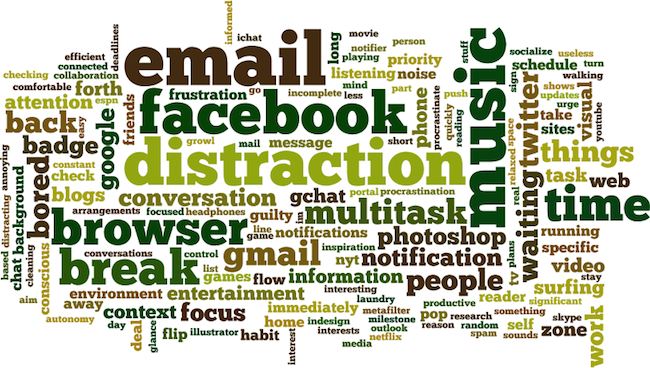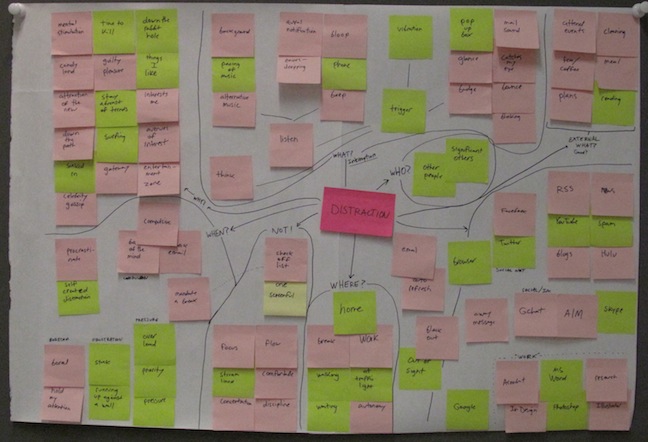Interviews
To get a better sense of how distraction impacted members of my audience, I conducted a series of interviews with members of the to determine how people used their attention in three contexts: At home, at work, and while mobile.
Interview Script
Quotes
In total, I recorded over 10 hours of audio, and then I transcribed it to over 100 pages of text. I have included a few excerpts from the interviews below to offer a sense of how the interview subjects thought about distraction.
This interview subject feels distracted by their computer while on the phone. Later the participant complained about the computer also being distracting while watching TV:
There are times when I’m distracted by computer when I’m on the phone. So there are times when I’m actively listening on the phone or checking my email or trying to multitask and do other things while I’m on the computer and that’s not very efficient. And I think, it’s just sort of my own self-created distractions that are just sort of surfing the web and checking my email.
Another participant spoke specifically about their usage of Facebook:
Usually, I’m going on Facebook for a specific reason, like to send a message of check something, like an email address or phone number off someone’s profile. But you show and it’s like Candyland. There’s a whole list of other people’s lives right there you can click through. And sometime’s there’s graphic candy like photos and links. So that can be a rabbit hole.
This participant spoke about feeling distracted at work:
…I know that I’m always connected to the Internet and it’s always a control-tab away to look at more information. Information that I haven’t seen or heard about or something new that can be intriguing. So it’s always in the back of my mind. I always try to focus myself and say I’m going to work for at least this much more time, and then try and reward myself by looking at the blogs for a few minutes. … I think I use it as a tool to influence whatever I’m working on. I get inspiration, motivation, from seeing things online so I think it’s kind of a tool, almost. To feel my creativity.
And finally, this participant spoke of the impact of both context and deadline pressure in their work:
…The more comfortable and relaxed I am in a situation is the more likely I am to be distracting myself. And I guess part of it is time, too, if I don’t have much time to work on something, I’m not going to be distracted for a second. If I have four hours to pull something off and I know it’s going to take four hours, I won’t blink, you know? I’ll have thumping techno music and a big cup of coffee and I will focus the entire time.
One subject also described that some level of distraction is acceptable:
I will blow anywhere from an hour to just like catching up on reading the news of the day. Which I've learned to feel not as guilty about it, because I do like reading and researching a lot, and I do find a lot of the stuff I read ends up somehow coming up in an idea or project later on. So I kind of value that distraction that time, if I'd even call that distracting.
Analysis
A few general patterns appeared early in an analysis of the interview transcripts:
- There are three primary cases when users become distracted: When they are feeling frustrated, when they are feeling bored, and after they have completed a goal. I would describe as the ABCs of distraction: Avoidance, Boredom, and Completion, respectively.
- The location in which people are using their computers makes a major difference in behavior. Users behave very differently at home than they do at work.
- Users tend not to take scheduled breaks. Breaks tend to be more improvisational (“I would like to take a break now”) or heuristic-based (“I have done work for about an hour, so I’ll take a break.”)
- Working in close quarters with other people tends to keep people focused on the task at hand. Paradoxically, other users are also often cited as being among the most frequent distractions.
- Email badges and notifiers (windows that appear to tell you something has happened) are very distracting.
- Music is distracting for some people and not for others. The distraction level of the music (and the distractability of the user) may depend on the task.
- IM is cited as one of the most distracting activities. Some users report have long conversations that might last an entire day.
- Multitasking does not seem to be quite as widespread or impactful as I had thought. Sometimes multitasking is useful.
- Some users were generally not willing to blame the technology for their distraction. Most of them believed they were at least partially at fault because their self control was not preventing them from being distracted.
- Most users described the process of browsing the web as something like “candyland,” “down the rabbit hole,” “sucked in,” or a “guilty pleasure.”
- Some users seemed to have realizations during the interviews of a behavior that had been distracting them. In one case, the behavior had even been put into place to avoid distractions. One use even claimed that “this [was] a very, very depressing interview” because it seemed to crystallize patterns of behavior that the user had not considered before.
Wordle
I used the free Wordle tool to generate a visualization of the most common words that appeared in the interview:

Communication and social networking tools came up frequently in the interviews, and they show up accordingly in this chart. Facebook, email, gmail, people, and chat are some of the most common words that appeared.
Clustering
After creating the world, I wrote down a list of some of the most common words and themes I noticed in the interviews. I then did a clustering exercise with the list of words.

The exercise was helpful in determining the contexts that people feel distracted in, how they cope with distraction, and what they do when they are distracted. 
Summary
There were four primary takeaways from the interviews:
- The context in which knowledge workers feel most distracted is at work. Users don’t mind feeling distracted at home, and smartphone use tends to be for shorter periods and is more task-focused. If no goal has been set, then there is no activity that could distract you from completing it.
- Users don’t know how distracted they are. They don’t know much time they spend on the sites they find distracting, and they don’t know how frequently those sites are checked.
- There seems to be a clear distinction between activities that are distracting and activities that productive. Everybody seems to know what they should be doing, or not doing.
- Users don’t necessarily want to be productive all day. People like taking breaks, and those breaks can take many forms. Some breaks are spent doing activities that would otherwise be considered distracting.
Copyright © 2010 - 2011 Eric St. Onge
Please send questions or comments to eric at ericstonge dot com.